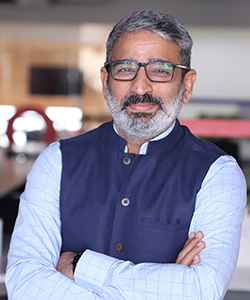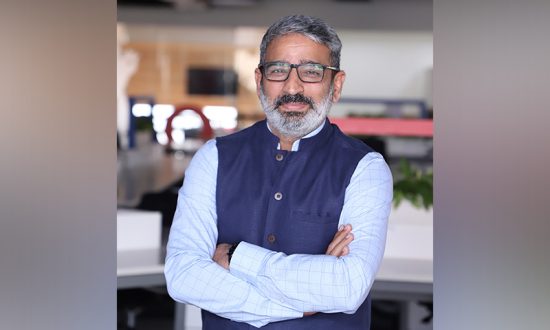Lalit Mehta, the Co-founder & CEO at Decimal Technologies is the driving force behind the company that has pioneered digital banking over the last decade. Lalit founded Decimal Technologies in 2009, when the concept of digital transformation in the BFSI sector was in its infancy. Under his leadership, the company enabled early adopters in Indian banking ecosystem to implement digital technologies and thereby helping them to become leaders in new-age banking today.
Banking is evolving rapidly with the changing expectations and behaviours of customers and emerging technologies. During the coronavirus pandemic, integration of technology and digital transformation became the call of the hour in a socially distanced world and financial organisations had no choice but to adapt.
The shift towards digital banking is accelerating as consumers are increasingly starting to prefer virtual processes. Financial institutions are partnering with Fintechs to meet the new demands and application programming interfaces or APIs are witnessing a surge in utility, giving rise to ‘Open Banking’.
Open Banking is not a new concept but it gained prominence during the past year when the move to digital became essential. Open Banking works when banks and other financial share their consumer banking data with third-party financial service providers such as Fintechs. This data sharing is done through APIs as they allow varied softwares to communicate with each other instantly. This enables the establishment of strong networks across financial institutions and creation of robust mobile platforms addressing the customers’ demands of ease of doing cross-platform financial transactions.
Financial institutions can build better products and services on the back of Open Banking. For instance, a person might have multiple bank accounts for different purposes and keeping a track of the transactions from all the accounts can get tedious. In this case, open APIs built by banks that allow Fintechs to read the transaction data can export the account management in one accessible mobile app.
Many leading banks in India such as YES Bank, Kotak Bank have opened their API portals for collaboration with niche fintechs. With the access to data from financial institutions, Fintechs are able to build solutions that enhance the customer experience with personalised offerings, foster innovation and partnership between Fintechs and banks, and democratises the financial infrastructure.
Open Banking in India
Indians don’t have to look far to witness the benefits of Open Banking with one of its most significant successes being the United Payments Interface (UPI) that brought about massive transformation to the digital payments landscape in India. Transaction volumes over UPI more than doubled over the past year from 1.25 billion to 2.73 billion in March 2021. This is due to UPI offering customers an ease of conducting transactions with any other bank account by linking their bank accounts to registered mobile apps. It has enabled real-time payments and is driving financial inclusion.
Open Credit Enablement Network (OCEN) is another framework of APIs that has the potential of expanding access to credit to the unbanked and underbanked areas. The framework will allow the lenders (such as banks and NBFCs), loan service providers (such as fintech players) and account aggregators to interact and develop innovative scalable credit products. Lenders also need to adopt customer-centric business models to survive and by addressing the needs of the MSME segment, OCEN will ensure real-time loan approvals.
In another boost to the digital banking, RBI recently announced their decision to allow mobile wallets to process RTGS and NEFT transactions. This means that mobile wallets will soon be able to receive and transfer funds, a service that was limited to bank accounts till now. Customers will also be able to use their mobile wallets to withdraw cash at ATMs. This will bring Fintechs companies on par with banks.
Customer-centric banking experience
Increased adoption of Open Banking can significantly improve the banking experience of the customers. Banks and other financial institutions usually offer limited options and standard services to all their customers. Open Banking will open up the choices available to customers and give them the freedom to go with the most customised of offerings. Domestic payments have already been made more convenient with digital wallets. The lethargic process of transferring money overseas is slowly being made smoother, less expensive and faster by fintech companies with the help of APIs.
Open Banking can empower customers by allowing them to take charge of their own finances by providing transparency. APIs can streamline the various financial activities linked to one customer in a single record and help them manage multiple accounts in with ease.
With data being the foundation of Open Banking, cybersecurity remains the most important aspect of this framework. It is important for the banks to prioritise privacy, security and strict laws ensuring both as they move towards Open Banking and the society transforms into a cashless global economy. Fintech partners can identify the risks beforehand and build infrastructures to mitigate them. APIs also provide the added advantage of communication without a customer’s account credentials being revealed, that is, the Fintechs do not store passwords or other data.
Conclusion
In the highly competitive banking industry, it is important for financial institutions to adopt a customer-centric approach. Customers prefer more autonomy over their financial transactions. The traditional model of banking will not be sustainable for long as the demands to be able access to financial data anytime is increasing. Open Banking is expected to transform the banking industry over the next few years and the financial institutions need to adapt to it in order to not be left behind.
More About Lalit Mehta

At Decimal Technologies, Lalit’s role encompasses conceptualizing new products & offerings, own key client relationships, giving direction and shaping the future roadmap for the company. He has built a path for Decimal where it can keep reinventing every few years and stay ahead of the curve. Lalit has been instrumental in design and delivery of some of the best know Digital Implementations in Indian Banking and Financial Services.
Lalit has over two decades of experience leading innovation in the fields of finance and technology. He is a serial entrepreneur who has founded another company in identity and access management viz., Mobico Comodo, in addition to one in the education space called The Olive Schools. Interestingly, Lalit has also worked in the automotive space and was a part of his family car dealership business before he found his calling in finance.
Lalit holds an MBA from Indian Institute of Management, Ahmedabad.


